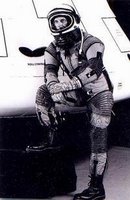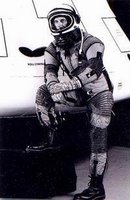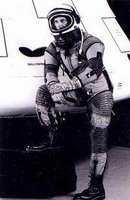THE NEW DEAL & THE ALPHABET
Wallace A. Johnson MBA

Apollo Project Test Pilot
CDR. Spaceship DEWAJ
Senior Navigator Test Pilot
It would help you immensely, if you were my age or thereabouts, to understand what I am about to tell you. I remember distinctly hearing the inaugural speech given by the new elected president Franklin Delano Roosevelt. It was notably remembered by historians as the message where he said that “We have nothing to fear but fear itself.” I could be wrong about the exact words, but that was its meaning. That famous quote was followed by his saying that the nation needed a “New Deal.” and that leads me to the Alphabet.
Government agencies are notorious for acronyms, and I can understand the dilemma a new agency has when it has to tie its name with its function. I can relate to the problem in my own personal way. Let me digress for a moment. Many of you know that my wife’s name was Doris Elizabeth. So I tied her first two initials DE, into my initials WAJ, and came up with DEWAJ as an acronym for my DBA (Doing Business As) license. Also, DE in Spanish stands for “of” and it tied in well with the WAJ portion. So for years I used DEWAJ in many ways, including the registration of a Star in the constellation of Sagitta near Sagitarius to be designated as DEWAJ. I did that as a present to my wife on our wedding anniversary. When I decided to get my own web site, I wanted to use DEWAJ, which explains my doing business as DEWAJ Synergy International. That has worked well for some years now and I continue to use it to this day. However, when my wife died, I decided to really start concentrating on my web site in earnest. So I decided to have my own Spaceship and naturally I wanted to call it Spaceship DEWAJ. So far so good, I had used DEWAJ OK, but to tie the acronym to it was a problem. It took some time, but all of a sudden it hit me like a bolt of lightning. DEWAJ A “Daring Enterprise With A Journey.” and it fit perfectly. The idea was to have a Spaceship which would use Synergy to accomplish its mission to remain in orbit long after I am gone. By including others, we would use synergy and end up with an end result whose sum would be greater than the sum of the individual parts. I thought it to be a brilliant idea as an acronym and I’m real proud of it. So now my job is to make the acronym well known on the internet. That’s a daunting task, and I know I can’t do it alone. But if I can get any exposure at all, and with help from others who will be either Passive Passengers or Active Joint Venture Partners, I know that using Synergy, it can be done. Enough of that, to get back to “The New Deal & The Alphabet”
New administrations, whether government or private, are prone to come in with a new broom and give the place a clean sweep as it were. Roosevelt did this as well. So to give us all a “New Deal” required the building up of vast bureaucracies, all with high sounding names. Bureaucratic Alphabetization which was nothing new in government circles, really took off. If you can remember some of these, it will date you for sure, but I don’t care, in my case, you know I’m 80 right now, and I remember it with some nostalgia. Just to name a few. Do you remember the N.R.A. (National Recovery Act), how about the W.P.A. (Work Projects Administration), you can see the results of many projects completed under the W.P.A. to this day in the form of libraries, bridges, dams etc. The C.C.C. was another favorite one, especially for young kids who couldn’t find employment anywhere else. Here is a list I found and what they represented including some important dates.
United States bank holiday, 1933: closed all banks until they became certified by federal reviewers
Abandonment of gold standard, 1933: allowed more Money to be put in circulation to create a mild inflation
Civilian Conservation Corps (CCC), 1933: employed young adults to perform unskilled work for the federal government
Tennessee Valley Authority (TVA), 1933: a government program that ran a series of dams built on the Tennessee River
Federal Emergency Relief Administration (FERA), 1933: provided breadlines and other aid to the unemployed
Agricultural Adjustment Act (AAA), 1933: paid farmers to not grow crops
National Recovery Act (NRA), 1933: created fair standards in favor of labor unions
Civil Works Administration (CWA), 1933: provided temporary jobs to millions of unemployed
Public Works Administration (PWA), 1933: employed middle-aged skilled workers to work on public projects, cost $4 billion
Federal Deposit Insurance Corporation (FDIC) / Glass-Steagall Act: insures deposits in banks in order to restore public confidence in banks
Securities Act of 1933, created the Securities and Exchange Commission (SEC), 1933: codified standards for sale and purchase of stock, required risk of investments to be accurately disclosed
Indian Reorganization Act, 1934
Social Security Act (SSA), 1935: provided financial assistance to: elderly, handicapped, delinquent, unemployed; paid for by employee and employer payroll contributions
Works Progress Administration (WPA), 1935: a reiteration of the PWA, created useful work for skilled workers
National Labor Relations Act (NLRA) / Wagner Act, 1935: granted right of labor unions to exist
Fair Labor Standards Act (FLSA), 1938: established a maximum normal work week of 40 hours, and a minimum pay of 40 cents/hour
Although Roosevelt was attacked then as now for that matter, you would be hard pressed to get rid of some of those programs that are still with us today, even though they may have a different name. Social Security is one example. However, I want to point out some incongruities that to this day I don’t understand. Take for example the A.A.A. where farmers were paid NOT to grow crops. I understand the law of supply and demand and the need for a market to exist, but I can remember kerosene being poured on piles and piles of oranges then having them set on fire to destroy them, all the while, I would give my right arm just for the chance to savor the beautiful fruit denied me because I couldn’t afford to buy it. I can also remember agents of the government rounding up many head of cattle into a lot and indiscriminately shooting them dead. You would think, hoof and mouth decease, but it wasn’t that at all, just that there were TOO MANY cattle on the market and to sustain a price on cattle, you had to have a scarcity. All the while there were an awful lot of people who weren’t eating much meat believe me, and I was one of them.
These are just a few of the things that I remember occurring during that time which made me very cognizant of social conditions and some of the inequities that existed, many for no reason at all that made any sense to me. Somehow, my family survived. In my next entry to my blog, I’ll let you know how I did my best to understand and survive as well.



